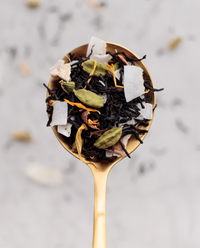The benefits of black tea
We are always asked about the benefits of our products. So let's discuss the benefits of black tea !

The story behind black tea
Tea comes from a fascinating plant: Camellia sinensis. In Latin, "sinensis" means China, reminding us of the origin of this treasure. But do you know the legend of black tea?
Black tea discovering
Like many culinary discoveries, its origin is thought to be due to chance.
Tea began its journey around the world in the 17th century with the emergence
of the British East India Company. During long sea voyages, green tea leaves,
exposed to heat and humidity, would darken.
But it took more than that to deter explorers from tasting the precious drink.
It was so well-loved that it became the favorite beverage of the royal court,
replacing alcoholic drinks at meals.
A beverage full of benefits
Since then, tea has become the most consumed drink after water.
From green to red, white to black, each type of tea offers unique
aromas and invaluable benefits.
Black tea, particularly appreciated by the English, is filled with virtues derived from meticulous craftsmanship.

Black Tea: An Alchemy of Flavors and Benefits
Institutions such as Harvard and the National Institutes of Health recognize tea as a health-promoting drink.
The term "tea" refers to the processed and dried leaves of the Camellia
sinensis plant. Teas come in various forms depending on preparation techniques.
Appreciated for its rich flavors, black tea is a favorite among tea lovers. Its careful processing enhances its benefits and unique malty taste.
Tea, which doesn’t naturally grow black, becomes dark through a controlled oxidation process.
Here’s a quick overview of the key steps:
- Withering: Freshly picked leaves are dehydrated to
make them more pliable. - Rolling: The leaves are rolled to release their
enzymes and start oxidation. - Oxidation: Placed in a controlled environment, the
leaves undergo full oxidation. - Drying: They are then dried to stabilize their aromas.
- Grading: Once dried, the leaves are sorted by quality.
Black tea is available in various types based on origin and manufacturing method, each offering unique flavors: some with robust and malty notes, others with floral nuances.
This diversity makes it a refined drink, as prized as fine wines or coffees.
The Impact of Oxidation
It is during exposure to air that tea leaves oxidize. But what interests us is what happens as a result of this reaction!
Tea leaves are rich in polyphenols, like catechins. During oxidation, these
catechins transform into other compounds: theaflavins and thearubigins, bioactive compounds in the flavonoid category.
It’s this concentration of flavonoids that gives black tea leaves their color, their beautiful amber-red infusion hue, and the drink’s distinctive warm flavors.
But their effects don’t stop there. These are powerful antioxidants that protect our bodies by fighting free radicals. We’ll explain it all in detail!

The Health Benefits of Black Tea for Body and Mind
A Natural and Gentle Stimulant
Black tea contains theine, the same molecule as caffeine.
But why does black tea stimulate without causing agitation?
Caffeine content: A 250ml cup of coffee contains an average of 150 mg of caffeine, whereas the same amount of black tea contains about 60 mg.
Bioactive compounds that slow caffeine absorption: Thanks to tannins and flavonoids, the absorption of theine is slowed down, providing a gentle, sustained boost without the side effects of coffee.
So, make it a habit to treat yourself to a moment of relaxation any time of day with a cup of black tea that spares you from palpitations, headaches, and jitters.
Stress Reduction
L-theanine, an amino acid in tea, promotes relaxation without drowsiness by stimulating the production of alpha waves in the brain.
Combined with theine, it provides a serene energy, allowing you to stay calm and focused.

Cardiovascular Health Benefits of Black Tea
Reduction of Bad Cholesterol
Black tea reduces bad cholesterol thanks to polyphenols that limit fat absorption. These bioactive compounds break down cholesterol into bile salts, which the body naturally eliminates. This process supports better heart and arterial health.
Regulating Blood Sugar for Diabetics
The polyphenols in black tea improve insulin sensitivity thanks to tannins, which slow down sugar absorption. This helps manage blood sugar spikes, providing valuable support for those aiming to maintain stable glucose levels.
Black Tea : A Natural Fat Burner
The catechins in black tea stimulate thermogenesis, increasing calorie expenditure even at rest. They also inhibit the formation of new fat cells and activate enzymes that promote the breakdown of fats, especially visceral fat.
Black Tea Promotes Digestion
The tannins in black tea have an astringent effect, slowing digestion and prolonging satiety. By modulating digestive enzymes and reducing inflammation, tannins promote lasting digestive comfort.
Black Tea’s Contribution to the Immune System
Theaflavins and thearubigins, powerful antioxidants, help fight oxidative stress, a factor in immune weakening. Moreover, their anti-inflammatory properties prevent excessive immune responses, contributing to protection against certain autoimmune diseases.
Black Tea Consumption May Support Oral Health
Theaflavins and thearubigins in black tea are the protectors of the Camellia sinensis plant in its natural environment.
Among their many defense roles, they inhibit the growth of bacteria that pose a risk to the plant’s healthy development.
By consuming black tea, you take on this natural superpower. When you drink black tea, polyphenols reduce bacterial proliferation in the mouth. A cup of black tea can therefore be part of an effective oral hygiene routine.
Black tea is much more than a drink: it is rich in history, flavors, and health benefits. Whether you enjoy it for its malty taste or its beneficial effects, black tea invites you to discover a daily wellness ritual.

Tea & Gastronomy
Tea isn’t just a drink—it’s an experience that can elevate and complement a wide variety of dessert and dishes.














